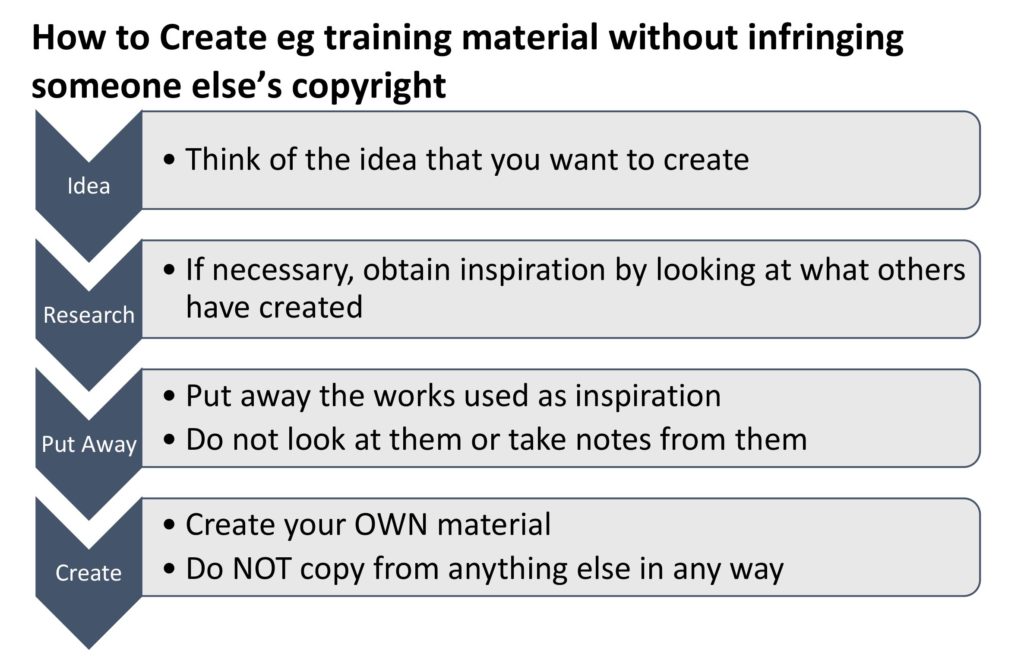Copyright
Received a letter of demand from Getty Images? Find out what to do next here
How to avoid copyright infringement
 Copyright – what are you allowed to do?
Copyright – what are you allowed to do?
- Copying anything that occurs in nature
- Copying anything that in which you own the copyright
- Where no copyright exists eg the work is a common design not owned by anyone
- Coming up with something similar without reference to a copyright work (but BEWARE, if it looks like a copy, a court will assume it is a copy unless you can prove otherwise! )
Copyright – how much of a copy is too much?
- There is no magic % that you are allowed to copy from a copyright work.
- A copy of even a small part eg one paragraph from a novel, or a part of a painting
- The test is whether looking at it objectively someone might think there was copying.
- If the objects are objectively similar, then the person who is alleged to have copied must PROVE that there was no copying
Copyright – What are you not allowed to do?
- COPY someone else’s work – if you come up with something nearly identical without reference to their work, that is permitted (although copying will be assumed where there are very similar, unless you show otherwise)
- Modify someone else’s work
- Make an adaptation of someone else’s work eg. Photograph a painting, writing a play based on a novel.
- Even displaying an artwork in public without the copyright owner’s permission can be an infringement
Copyright and the Internet
- MYTH = if it is on the internet, I am allowed to copy it
- Material on the internet is protected by copyright like any other material (it is just easier to copy or download!)
- Copying onto your hard-drive, downloading, printing, copying to disc, emailing a copy, cutting and pasting, modifying are all prohibited activities, unless you have the permission of the copyright owner.
- EXCEPTION – you can make copies of material which a website authorises you to copy or material that is no longer under copyright protection (copyright can last for 50 years after the death of the creator).
How Do I Protect My Copyright?
- It is not possible to register copyright (other than in Amercia)
- Copyright automatically exists as soon as you create a creative work such as a drawing, a book, a photograph, a song, provided your creative work is original (not itself a copy).
- Other works that attract copyright are computer software, written documents (such as office policies and procedures), layout and design (eg of a website or a brochure).
- Even a telephone book as held by courts to attract copyright.
- Keep full records and original concept documents of all creative works you create. You might need these if your copyright is disputed
- When you create a creative work, you should always mark it with the copyright symbol (c) + the year + your name + (optionally) your contacts eg (c) 2014, Acacia Law, info@acacialaw.com
- Preferably lodge copies with an independent third party like a lawyer or accountant who can attest to the lodgement date and what was lodged (if your rights are challenged).
How to protect your copyright for free using the copyright symbol
Who owns the right to file patent/design/trade mark or who owns the copyright?
- If you create something while working for another person often your employer will own the intellectual property rights in what you create – even if it does not say so in your employment contract (but there are exceptions to this rule).
- Exceptions to employer owning intellectual property in creations of employees – where you create something in your own time, with your own resources, which is unrelated to your job eg. If you work as a check out operator and create jewellery at home. The law becomes more complicated if (as often happens) that the creator might have used some of their employer’s resources or equipment or did some of the creation during working time.
- If someone pays you or offers to pay you to create some copyright works (eg a painting, photograph, diagram) THEY OWN THE COPYRIGHT – even if they do not actually pay you! If you want to retain the copyright you need to make that clear IN WRITING eg suitable terms and conditions.
- Intellectual Property Rights in creations made while at school or university might belong to the school or university (it depends on the terms of the enrolment contract.
- When creating or inventing something that is going to attract Intellectual Property Rights, we strongly recommend that you have a written agreement relating to ownership BEFORE anything is created. Although, there are some provisions about ownership written into the law, it is possible to change the default position by written agreement. Having a written agreement tends to minimise the chances of disputes over intellectual property rights ownership.
What Are Moral Rights In Copyright Law?
- Even when an artist or author or other creator of a copyright work, does not own the copyright any longer, they have certain “moral rights”, for example
– to be acknowledged as the creator of the work
– not to have their work treated in a derogatory manner
- Moral Rights can be waived but not transferred. Many contracts assigning copyright also include a waiver of moral rights – once these rights are waived, the artist is not entitled to enforce them in the future.
Any of the business disasters listed below could be avoided, if you take proper advice from a patent and trade mark attorney, you can avoid these situations.
- You register your company name and Australian Business name and trade happily for many years. Out of the blue a competitor sues you for trade mark infringement and you discover that they have registered your company name as their own trade mark. You can probably get it back, but cannot afford the $100 000+ legal bill.
- You create an amazing design of a ring. It becomes the most popular design in the world. It sells millions of $’s a year – but you don’t see a cent of it
- You develop a revolutionary type of paint that every artist in the world begins to use. It sells millions of $’s every year – but you don’t see a cent of it
- As part of your artwork, you create a series of cartoon characters. They become more famous than the Simpsons – but Disney Studios steals them from you!
- You paint an amazing painting, and all of a sudden it is world famous. It is reproduced on postcards, books, tv , movies – but the owner of the painting claims that as the artist you have no rights to the reproductions – even if they distort or ruin your original.
- You design a children’s toy that becomes very popular and profitable. It sells in all the top stores – until the $2 shop sells a replica, and your income from the toy stops because everyone buys the $2 toy.
- You create a sculpture or other artwork that reflects the essence of your creativity, and someone decides to display it, but before they do they spray it with ugly graffiti, completely ruining your creation
- You create an incredible new process that makes producing medicine quicker and safer. You are confident that you are going to be rich until your employer sues you and says that they own the intellectual property rights.


